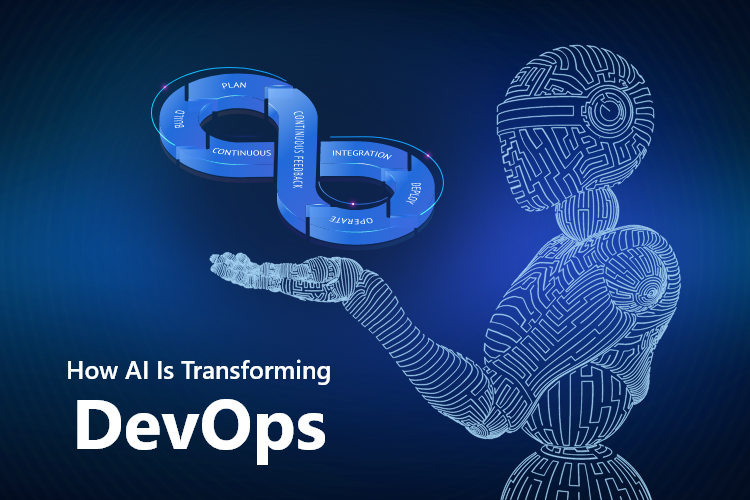How AI Is Transforming DevOps
- DevOps
- September 28, 2020
Checking and handling a DevOps environment engages an extreme level of complication. The absolute magnitude of data in these days’ deployed and dynamic app environments has made it tough for DevOps teams to absorb and implement data efficiently for identifying and fixing client problems.
DevOps’ future will be AI-enabled. Since humans cannot deal with huge volumes of data and computing in regular operations, AI will become a vital tool for assessing, computing and changing how teams build, deliver, distribute, and handle apps.
As per Gartner, 40% of DevOps teams will be utilizing app and infrastructure checking applications that have integrated Artificial Intelligence for IT Operations (AIOps) platforms by 2023.
However, before discussing how artificial intelligence is reshaping DevOps, let us explore how DevOps and AI work together.
How DevOps and AI Are Interrelated
AI and DevOps are interrelated as AI is the technology that is integrated into a system for improved performance and DevOps solutions is a business-driven way of delivering software.
Using AI, DevOps teams can examine, code, launch, and check software more effectively. Moreover, AI can boost automation, address and fix problems fast, and boost cooperation between teams.
Read also: The Benefits of Employing DevOps
How AI Is Transforming DevOps
AI can play a pivotal role in boosting the efficacy of DevOps. It can enhance functionality by allowing immediate building and operation cycles and offering an alluring client experience on these features. Machine learning can ease data collection from different parts of the DevOps system.
This incorporated flaws discovered, velocity, and burn rate that is more conventional development metrics. Data produced by constant integration and distribution of tools is another part of DevOps. Metrics incorporate the number of integrations, the time between them, flaws per integration, and its success rate. These are worthy when they are precisely assessed and compared.
What is specifically interesting regarding the 10 ways AI is transforming DevOps is how efficient it is trying to be in supporting developers in the tough, time-consuming tasks that withdrawing from coding. The following 10 ways showcase how AI is accelerating DevOps these days:
1. Enhanced Data Access
The inadequacy of free access to data is one of the most vital problems experienced by DevOps teams. AI can help release data from its organizational storehouse for big data collection.
AI can collect data from different sources and arrange it for being useful for regular and repeatable assessments.
2. Better Implementation Efficiency
Humans handle a rule-based environment in DevOps. Its movement to self-controlled tasks boosts efficiency. With the help of AI, machines can perform by themselves or with less human intervention. Thereby it makes human free so they can be available for concentrating more on innovation and creativity.
3. Faster Resource Management
AI offers the much-required capacity to automate repeatable, regular tasks. Since machine learning and AI emerge, it increases the possibility and complication of the tasks that can be automated.
4. Enhanced Security
Nowadays DDoS (Distributed Denial of Service) is very active. Any small and big website and the company can be targeted. Machine learning and AI can be utilized for addressing and dealing with these threats.
An algorithm can be utilized for discriminating usual and unusual conditions and take steps accordingly. Developers can use AI to increase DevSecOps and boost security. It contains centrally logging architecture for addressing threats and anomaly.
5. Prompt Alerts
DevOps teams require having a properly built alert system for addressing defects immediately. At times alerts appear in many numbers and all are known with a similar extremity. This makes it very tough to respond and react.
Machine learning and Artificial Intelligence can help DevOps teams give priority to their responses depending on some factors such as the source of the alerts, the depth of the alert and past behavior. When systems are filled with data, they can handle such situations effectively.
6. Software Testing
Artificial intelligence helps boost process development and its testing. DevOps utilize different kinds of testing like user acceptance testing, regression testing, and functional testing. A huge amount of data is generated from these testing.
AI recognizes the collected data’s pattern and then addresses coding practices that caused the error. Thereby, the DevOps team can utilize this data from now to boost their efficacy.
7. Faster Failure Predicting
A big failure in a specific tool or area in DevOps can make the procedure weak and reduce the speed of the cycles. The models of machine learning help forecast an error depending on data. AI can read patterns and anticipate the symptoms of failure, particularly when a happened issue can create definite readings.
AI can see indicators that humans can’t notice. These early notifications and anticipations help the team address and solve the problems before they get an effect on the SDLC (Software Development Life Cycle).
8. Feedback Loop
The basic role of DevOps is to collate feedback from every phase. For this reason, the team uses monitoring and performance tools. These tools utilize machine learning features like log files, datasheets, performance matrix, and so forth. As per this feedback, they make recommendations and execute them.
9. Swifter Main Cause Assessment
AI uses the patterns between activity and reason to decide the primary reason for the failure. Sometimes, engineers do not review the failures in detail as they are based mostly on going Live. They assess and fix problems lightly and abstain from the detailed main cause assessment.
If lightly fixing the problem makes everything fine, the main cause stays unknown. Hence, it is necessitous to solve an issue permanently by managing the main cause assessment. AI plays a crucial role here.
10. Assessing Past Performances
Machine learning can be an amazing asset to developers when it comes to developing an application. It helps test the earlier apps’ success in terms of development or compiling success, successful finishing of testing, and operation functionality.
Moreover, machine learning can actively offer suggestions based on the code being written by developers. Artificial intelligence can guide the developers to develop the most premier, different, and efficient app.
Is There Any Risk of AI in DevOps?
It is important to make the system trained with precise information. In case the data is not enough trained, it can provide you incorrect results.
Various users can have various needs related to software and hardware. Models used by them can also be distinct. Someone can use Pytorch, whereas another one can use Tensorflow. In that case, it’s tough to make the sync between them.
As in currently, AI is less settled. Hence, it becomes tough for a tech leader to convince their higher authorities to spend money on AI-based tools. Investors usually prefer investing in popular and established projects and applications.
Final Notes
Speeding up the development cycles while making sure the best quality code gets formed is a challenge faced by every DevOps team. AI is helping to transform every stage of DevOps building cycles by predicting what developers require before they request for it.
Enhanced software quality guarantee tactics with automated testing, automatically recommending code sections, and organizing requirement handling are the main areas of DevOps where Artificial Intelligence is giving value these days.
So, want to embrace your DevOps practices with AI? Our AI development services can help!













